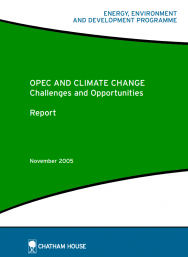
OPEC and Climate Change: Challenges and Opportunities

Executive Summary
OPEC countries tend to be highly reliant on revenues from the export of fossil fuels and they have consistently argued, throughout the climate negotiations, that measures taken by Annex 1 countries to reduce greenhouse gas emissions would have a major impact on their economies. They have advocated financial compensation to offset any adverse impacts.
If the climate change negotiations are to move forward, new approaches will be needed to engage constructively with energy exporters in moving towards a low carbon future. This in turn requires a better understanding of the position of OPEC countries, their national interests and the interaction with wider political and economic priorities and trends. This report seeks to facilitate this through an examination of OPEC countries in the climate negotiations; to identify the key challenges and drivers in relation to wider domestic and political concerns; and to examine the scope for more constructive
dialogue on climate change.
- Issues:
- Energy, Climate Change, Natural Resources
- Regions:
- Middle East and North Africa, Africa, Latin America, Oceania, Sub-Saharan Africa
- Countries:
- Algeria, Indonesia, Saudi Arabia, Iraq, Iran, Qatar, United Arab Emirates, Libya, Nigeria, Venezuela
- Year Published:
- 2005
- Institution:
- Chatham House, the Royal Institute of International Affairs

